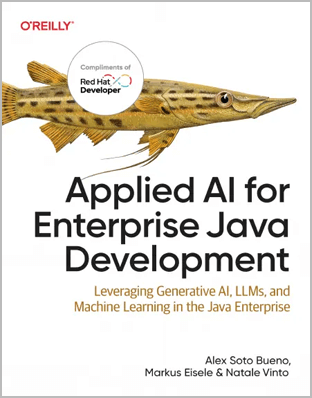Why Java for AI?
Artificial Intelligence is reshaping enterprise software, and Java remains the backbone. Its long-standing reliability, security, and scalability make it ideal for building AI-infused applications.
Java in Data Preparation
Many AI initiatives begin with robust data processing pipelines.
Effective AI requires two distinct pipelines:
- Training Data Preparation
- Build predictive models with DeepLearning4J (DL4J). Java’s ecosystem, including Apache Kafka, Apache Flink, and Apache Camel, supports large-scale ETL, data cleansing, and preprocessing across enterprise data.
- RAG Data Preparation
- For Retrieval-Augmented Generation, ingest documents and business knowledge, compute embeddings, and index in vector stores. Java seamlessly connects to databases, message brokers, and vector stores, enabling RAG pipelines that are both fast and reliable.
This dual capability, supporting both model training and RAG processes, makes Java uniquely powerful in AI architectures.
Java for AI-Infused Applications and Intelligent Applications
Once data and models are ready, enterprises need applications that:
- Embed AI in customer-facing workflows (chatbots, fraud detection, document assistants).
- Interact with predictive and generative AI models (in-process, locally or remotely).
- Scale from prototype to production on cloud or on-prem.
The JVM ecosystem ensures consistency, portability, and performance across deployments.
Enterprise-Grade Security, Governance & Observability
Java brings full enterprise readiness to AI systems:
- Security by Design:
- Supports traceable inputs, audit trails, and governance-ready execution from day one.
- Proven at Scale:
- Decades of enterprise deployment ensure predictable performance and long-term maintainability.
- Stable Innovation:
- Embraces modern tools like LangChain4j while preserving strong typing, backward compatibility, and developer familiarity.
- Observability:
- Java applications, especially those built with Quarkus, incorporate metrics, tracing, and logs, thereby improving operational tasks. This unified telemetry enables real-time monitoring of AI pipelines and live troubleshooting.
Java & Emerging AI Protocols
The Java ecosystem has long been foundational for interoperability.
So, it’s not surprising to see Java client and server implementations for the emerging AI protocols, such as:
- MCP (Model context Protocol): Enables building servers and clients that integrate LLMs with enterprise systems.
- A2A (Agent-to-Agent): Supports reliable autonomous agent communication across ecosystems.
Java’s mature networking and concurrency capabilities make it ideal for implementing these agentic, AI-driven architectures.
Dive into using Java and AI
For Java enterprise developers and architects looking to expand their skill set into artificial intelligence and machine learning (AI/ML), getting started can feel intimidating, especially when faced with complex theory, data science, and unfamiliar programming languages.
Check out "Applied AI for Enterprise Java Development" by Alex Soto Bueno, Markus Eisele, and Natale Vinto. It's a practical guide which shows you how to integrate generative AI, large language models, and machine learning into your existing Java enterprise ecosystem, using tools and frameworks you already know and love.

